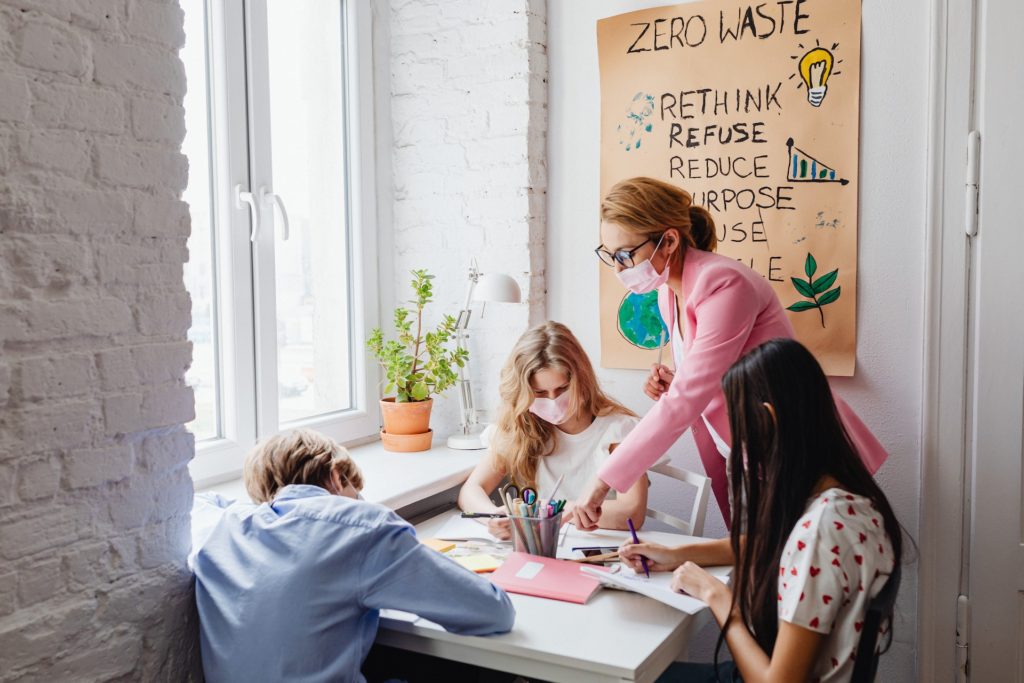Zero waste living is a lifestyle that aims to minimize the amount of waste generated by individuals, households, or organizations.
When you embrace this approach, you will effectively reduce waste at the source, reuse and recycle materials, and compost organic matter.
A zero-waste lifestyle will ensure that you reduce waste and environmental impact by making conscious decisions and changing daily routines.
We seek to explore the principles of zero-waste living, tips for beginning, the benefits of adopting this lifestyle, and some of the challenges and solutions involved.
What is Zero Waste Living?
Zero-waste living is a lifestyle and philosophy that aims to eliminate or significantly reduce waste production.
A zero-waste lifestyle reduces waste and encourages reusing and recycling materials to the fullest extent possible, thus reducing human impact on the environment.
A holistic approach to zero-waste living considers the entire life cycle of products, from production to disposal, and encourages individuals to take responsibility for their environmental impact.
Eye-Opening Stats on Zero Waste Living
- According to estimates, only 15% of Americans know what it means to be zero waste.
- The percentage of French consumers who got loose food instead of plastic packaging is only 29%.
- It would be possible to reduce plastic waste by 6,741 tons yearly if Europeans switched to reusable water bottles.
- The amount of recycled plastic waste on earth is only 9%. We are accumulating plastic in landfills and our oceans in large amounts.
- It can take up to 500 years for plastic products to decompose after disposal.
- According to estimates, the plastic industry will account for 50% of the world’s oil consumption by 2050 if it continues its plastic production.
- There will be more plastic in our oceans than fish by 2050. Oceans already contain about 165 million tons of plastic.
-
- Refuse
-
- Reduce
-
- Reuse
-
- Recycle
-
- Rot
Why Zero Waste is Important
Adopting zero waste practices at home is crucial for several reasons, including:
1. Protecting the environment
A significant contribution to environmental problems is waste, which leads to pollution, habitat destruction, and climate change.
The zero-waste lifestyle can help individuals reduce their carbon footprint and minimize their environmental impact.
By getting rid of pollution, preventing climate change, and conserving natural resources, we can help reduce global warming and continue living zero waste lifestyles.
2. Conserving natural resources
It takes significant energy and resources to produce and dispose of products. Individuals can conserve water, energy, and raw materials by reducing waste.
3. Saving money
Most people can save money by reducing consumption and avoiding unnecessary purchases through a zero-waste lifestyle.
Additionally, repairing and repurposing items instead of buying new ones can lead to cost savings over time.
4. Sustaining the environment
The zero-waste lifestyle promotes sustainable consumption and production patterns. They are critical to creating a sustainable future for our planet.
5. Enhances a healthy lifestyle
Practicing zero-waste living can encourage individuals to make more conscious decisions about what they consume and how they live.
You can promote better health by choosing sustainable transportation options, consuming a plant-based diet, and reducing exposure to toxins.
6. Builds community
An environmentally friendly lifestyle can help build community by bringing together like-minded people on sustainability and environmental responsibility.
You can build an eco-friendly community by creating local groups and initiatives to promote sustainability and reduce waste.
7. Ensures a sustainable future
You can create a more sustainable future by encouraging people to take responsibility for their societal and environmental impacts.
Future generations can benefit from a healthier and more sustainable world by reducing waste and promoting sustainable practices.
In general, a zero-waste lifestyle offers a range of benefits that benefit both individuals and the environment.
8. Encouraging social responsibility
You can promote social responsibility through zero-waste lifestyles by encouraging individuals to take responsibility for their environmental impacts.
These strategies can inspire others to adopt more sustainable practices and make the world healthier and more sustainable.
What are the 5 R’s of Zero Waste Living?

A zero-waste hierarchy prioritizes waste reduction strategies according to their effectiveness. Individuals and organizations can use it to identify the most effective ways to reduce waste and environmental impact.
There are four levels in the hierarchy:
First, we have the refuse. Since the first step involves refusing to produce a certain amount of waste, this can be a challenging practice for businesses.
Avoid using single-use plastics and non-recyclable materials to minimize waste production. Switch over to better and far less wasteful materials by following the logistics.
It is only common sense that if we want to reduce waste, we must prevent its generation in the first place.
This method involves reducing consumption, avoiding disposable products, and choosing durable and long-lasting items.
At the third level of the hierarchy, we must reuse items as much as possible. Rather than throwing things away, find new uses for them.
Instead of buying new items, use reusable bags and containers, repair and repurpose your old stuff, and donate your unwanted items.
The fourth level of the hierarchy involves recycling items. These items are those you cannot reuse or reduce.
The process involves separating recyclable materials from the waste stream and processing them into new products.
It is vital to note, however, that recycling should only be a last resort after reducing and reusing options have been exhausted.
Composting organic matter, such as food scraps and yard waste, is the last level of the hierarchy. It is possible to make fertilizers from organic waste through this process.
In addition to cutting down on organic waste going to landfills, composting also reduces the amount of methane generated.
The zero-waste hierarchy helps individuals prioritize waste reduction strategies based on effectiveness and create a more sustainable and responsible lifestyle.
How do you Live a Zero Waste Lifestyle? 10 Tips for Beginners

Researching and finding local resources, such as bulk stores and community composting services, is the first step towards zero waste living.
We can all contribute to a more sustainable future and protect our planet for future generations by following these 10 ways to adopt a zero waste lifestyle.
1. Bring reusable containers and bags
When shopping or buying food to go, use reusable bags and containers rather than disposable ones. By doing this, you can reduce waste and save money.
2. Avoid single-use plastics
Do not use plastic straws, utensils, or water bottles that are single-use. Consider reusable alternatives instead.
3. Compost organic waste
Composting is a method for reducing organic waste and creating soil rich in nutrients. Use a community composting service or start your compost bin at home.
4. Use long-lasting items
Instead of disposable items, choose durable and long-lasting items that can be repaired or repurposed.
5. Buy in bulk
It is possible to reduce packaging waste and save money by buying in bulk. When shopping for bulk items, bring your reusable containers.
6. Use cloth instead of paper products
Rather than paper products such as napkins and paper towels, use cloth napkins, towels, and rags.
7. Repurpose and repair items
Repair and repurpose old items instead of buying new ones. You can save money and reduce waste by doing this.
8. Reduce food waste
Using leftovers and food from the refrigerator can help you reduce food waste.
9. Buy secondhand
Instead of buying new items, get those that are secondhand. Using this method can save you money and reduce waste.
10. Choose sustainable transportation
Don’t drive alone; instead, walk, bike, or take public transportation. Doing so can reduce carbon emissions and lead a healthier life.
Issues in Migrating to Zero-Waste Living
It can be challenging to move toward a zero-waste lifestyle for several reasons:
1. Little accessibility
You can have difficulties finding zero waste living alternatives, such as bulk stores or community composting services, in certain areas.
Zero waste practices at home may become difficult and may require more planning and effort because of this.
2. Pressure from society
It can be challenging to adopt zero waste living due to societal norms around consumption and waste.
It is possible for people to feel judged for their choices or to feel pressured to conform to a different lifestyle.
3. Poor knowledge and inadequate resources
It may be difficult for individuals to adopt zero waste living practices due to inadequate knowledge and resources.
People might find it overwhelming to compost or find reusable alternatives, for example.
4. Expenses
Investing in reusable alternatives or buying durable and long-lasting items can be more expensive upfront than other zero-waste alternatives. You will need to adjust your priorities and budgets as a result.
5. Comfort
Alternatives to disposables may not be as convenient as disposables. You may need to make more effort and planning to bring your reusable bags and containers, for instance.
Despite these challenges, it’s important to remember that adopting zero-waste living is a journey, not an overnight transformation.
It is critical to start small, focus on progress instead of perfection, and seek support and resources.
In the long run, you can benefit their health and the environment by transitioning to a zero-waste lifestyle.
Solutions to these Challenges
To overcome the challenges of transitioning to zero-waste living, here are some solutions:
1. Find the resources you need
Identify recycling programs, bulk stores, and community composting services close find zero-waste resources.
This way, you can access zero-waste alternatives and have a seamless transition.
2. Meet people that share the same goals
Find like-minded individuals also interested in reducing waste by joining zero-waste movement groups. You can share tips and resources and feel a sense of community and support.
3. Get educated
Find out how to compost, use reusable alternatives, and buy in bulk from a zero waste store. Understand the benefits of being environmentally friendly to make informed decisions.
4. Take small steps
Make small changes to your daily life, such as bringing your reusable bags and containers, using cloth napkins, or refusing single-use plastics. By doing this, you can build momentum and make the transition easier.
5. Spend wisely
If you are committed to zero waste, consider shifting your spending priorities to sustainable alternatives.
Over time, this can result in significant cost savings, but it may require a different budget and mindset.
6. Strive for change
Promote zero waste practices in your community and reduce waste by encouraging local businesses and governments to adopt them.
As a result, more eco-friendly resources can be made available, and sustainable alternatives can become more normalized.
In general, education, support, and action are needed to overcome the challenges of sustainability, eco-friendly lifestyles, and zero-waste living.
It is possible to successfully transition to an environmentally friendly lifestyle by taking small steps, seeking support and resources, and advocating for change.
Final Words: How to Start Living Zero Waste
Zero-waste living is a sustainable lifestyle choice that aims to reduce waste and promote sustainable initiatives and consumption patterns.
In addition to reducing environmental impact and saving money, it promotes a healthier lifestyle, builds community, and contributes to a more sustainable future.
Besides limited accessibility, social pressure, lack of knowledge and resources, cost, and convenience, transitioning to zero-waste living can also present challenges.
Individuals can overcome these challenges by researching and finding resources, connecting with like-minded individuals, educating themselves, starting small, prioritizing spending, and advocating for change.
Changing to a zero-waste lifestyle and positively impacting the environment and society is achievable with the right time, effort, and sustainable green initiatives.







